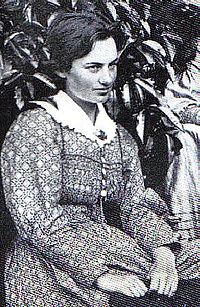Edith Durham
| Edith Durham | |
|---|---|
 |
|
| Native name | Mary Edith Durham |
| Born | 8 December 1863 London, United Kingdom |
| Died | 15 November 1944 (aged 80) |
| Academic work | |
| Main interests | Albanian history, Culture |
| Notable works | High Albania |
| Influenced | Robert Elsie |
Mary Edith Durham (8 December 1863 – 15 November 1944) was a British traveller, artist and writer who became famous for her anthropological accounts of life in Albania in the early 20th century.
Durham was the eldest of nine children; her father, Arthur Edward Durham, was a distinguished London surgeon. She attended Bedford College (1878–82) followed by the Royal Academy of Arts to train as an artist. She exhibited widely and contributed a number of detailed drawings to the amphibia and reptiles volume of the Cambridge Natural History (published 1899).
After the death of her father, Durham took on the responsibilities of caring for her sick mother for several years. It proved an exhausting experience; when she was 37, her doctor recommended that she should undertake a foreign vacation to recuperate. She took a trip by sea down the coast of Dalmatia, travelling from Trieste to Kotor and then overland to Cetinje, the capital of Montenegro. It gave her a taste for southern Balkan life that she was to retain for the rest of her life.
Durham travelled extensively in the Balkans over the next twenty years, focusing particularly on Albania, which then was one of the most isolated and undeveloped areas of Europe. She worked in a variety of relief organisations, painted and wrote, and collected folklore and folk art. Her work was of genuine anthropological significance; she contributed frequently to the journal Man and became a Fellow of the Royal Anthropological Institute. Her writings, however, were to earn her particular fame. She wrote seven books on Balkan affairs, of which High Albania (1909) is the best known. It is still regarded as the pre-eminent guide to the customs and society of the highlands of northern Albania.
After her pro-Serb phase, Durham came to identify closely with the Albanian cause and championed the unity and independence of the Albanian people. She earned a reputation as a difficult and eccentric person, and was strongly criticised by - and criticised in turn - advocates of a Yugoslav state, who supported the incorporation of Albanian-populated parts of Kosovo into Yugoslavia. She became increasingly anti-Serb, denouncing what she termed "Serb vermin" for having "not created a Jugoslavia but have carried out their original aim of making Great Serbia .... Far from being liberated the bulk of people live under a far harsher rule than before."
...
Wikipedia
